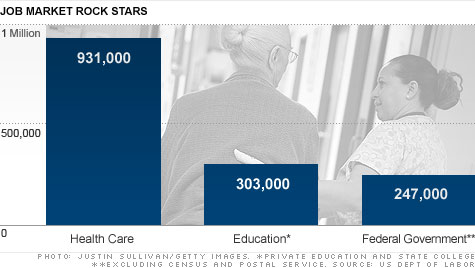Search News

NEW YORK (CNNMoney) -- While the overall job market was crippled by the effects of the Great Recession, some sectors never stopped hiring.
A CNNMoney analysis of the more than 140 sectors tracked in the Labor Department's survey of employers found 15 that grew fairly steadily from the start of the recession until today. And an additional 11 sectors have recaptured more than half the jobs that they lost during the recession.
"Even in the worst recession, there are still some industries adding jobs," said Heidi Shierholz, labor economist with the Economic Policy Institute. "The demand for their goods and services don't follow the business cycle."
The aging population, for example, has fueled demand for health care workers.
Health care has added jobs every month since the start of the economic downturn, resulting in nearly 1 million new jobs added to the economy, which comes to about 7% growth.
Within health care there were a number of fields that did even better. Home health care workers grew by nearly 20%, and outpatient care center employment increased by 18%.
Though people who lost their health insurance because of the recession might have hurt demand for some health services, overall, health care is a fairly recession-proof industry.
"If you have a heart attack, you're going to the hospital whether it's 2006 or 2010," Shierholz said.
And health care was not alone in weathering the economic storms of the recession without shaving staff.
Education was another winner. Private educational services and state colleges also experienced modest employment growth over the last four years, adding just over 300,000 jobs between them.
While some expensive private primary and secondary schools might have been hit by the downturn in the economy, others schools were helped by recently unemployed workers seeking retraining. And enrollment at more affordable state colleges picked up during the downturn.
The federal government was the one of the largest and steadiest engines of job growth during the downturn outside of health care. Excluding the Postal Service and the Census Bureau, civilian jobs in the federal government rose by 247,000, or 12.5%, since December 2007. And federal payrolls have grown in virtually every month.
(Postal jobs were slashed by 19% and the Census Bureau had a spike in temporary workers who to completed the 2010 census.)
Temporary workers took a major hit during the recession, but they've managed to come back faster than others workers. Temporary help services has recovered the most lost jobs -- more than 500,000 of the 800,000 jobs that were lost in the sector between December 2007 and the low point in August 2009.
While permanent jobs might eventually be better for the economy, the growth in temporary help is a good sign by economists who see it as a first step by employers to add permanent staffing.
Information services, which includes some high-tech and Internet jobs, has also been growing steadily. Payrolls grew by 16% through modest gains almost every month, creating around 20,000 new jobs since 2007.
Coal mining and oil and gas extraction have been two other sectors adding jobs, helped by the prices of those commodities. Coal mining has added 11% more jobs since the start of the recession, and oil and gas extraction has grown payrolls by 10%.
That amounted to only a combined 25,000 additional jobs -- enough to cut unemployment in some energy-resource rich states, such as North Dakota. The unemployment there is 3.6%, the lowest in the country.
Correction: An earlier version of this story incorrectly counted the number of federal jobs added. There were actually 247,000 jobs added since the beginning of the recession, excluding postal and census jobs. ![]()
| Latest Report | Next Update |
|---|---|
| Home prices | Aug 28 |
| Consumer confidence | Aug 28 |
| GDP | Aug 29 |
| Manufacturing (ISM) | Sept 4 |
| Jobs | Sept 7 |
| Inflation (CPI) | Sept 14 |
| Retail sales | Sept 14 |